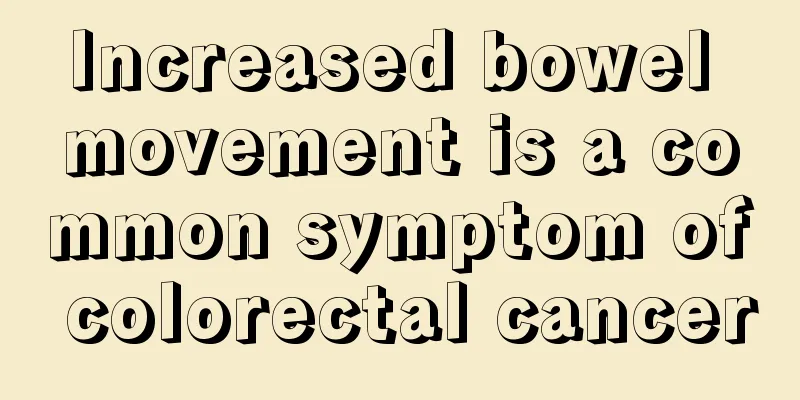What is the reason for quick digestion

|
Since everyone's physical condition is different, their gastrointestinal digestion and absorption conditions are also different. Some people's gastrointestinal digestion and absorption are very slow, while some people's gastrointestinal digestion and absorption are very fast. People whose stomachs and intestines digest and absorb food quickly often feel hungry not long after eating, which causes them a lot of trouble. So what is the reason for the fast stomach and intestines digest and absorb food quickly? Do many people feel that they feel hungry soon after eating? In fact, this is a manifestation of rapid gastric emptying, and there are other symptoms such as fatigue and gradual weight loss. However, in life, many people do not pay attention to this situation, thinking that they have strong digestive function and digest faster than others, so they eat when they are hungry, which is not a disease. In fact, this is incorrect. The harm of too fast stomach emptying is still very large, and the damage to the stomach is also continuous. So, what is the reason for too fast stomach emptying? In addition to emotions, there are many other factors that affect a person's gastric emptying rate, including various physiological and pathological factors. Reasons that affect rapid gastric emptying include: (1) Promoting factors: ① Food capacity in the stomach; ②Gastrin. (2) Inhibiting factors: ① Gastrointestinal reflex; ② Enterogastrone: secretin, gastric inhibitory peptide, cholecystokinin, etc. Accelerated gastric emptying is seen in patients with Zollinger-Ellison syndrome. In some patients with duodenal ulcers, gastric emptying of solid matter is accelerated, while liquid emptying is normal. The upper abdominal distension, nausea, vomiting, diarrhea, and weakness that patients experience 10 to 30 minutes after a meal after gastric surgery are considered to be early dumping syndrome. Palpitations, sweating, and weakness that occur 1 to 3 hours after a meal are considered delayed dumping syndrome. There is a large overlap in clinical symptoms of rapid or delayed gastric emptying, which can manifest as upper abdominal distension, early satiety, upper abdominal pain, nausea, etc. However, when gastric emptying is too rapid, in addition to the above symptoms, it is often accompanied by "dumping syndrome"-like symptoms such as diarrhea, intestinal cramps, and vasomotor symptoms. There are differences in treatment between the two, so it is important to distinguish them. Dietary and lifestyle habits that slow gastric emptying should be avoided. For example: do not eat acidic foods, do not eat high-fat foods, keep a happy mood, do not smoke, try to avoid using drugs that slow down gastric emptying, eat semi-liquid foods, etc. Apply gastric emptying theory, control diet, and slow down gastric emptying. In addition to detecting symptoms early in the early stages, patients with rapid gastric emptying should also do a good job of daily health care, develop good eating habits, avoid overeating, or eat raw, cold, and spicy foods. During the illness, be sure to eat things that are gentle on the stomach, pay more attention to rest, chew slowly when eating, and eat less acidic or overly sweet foods. |
<<: Easy-to-digest staple food
Recommend
What are the symptoms of prostate cancer
The symptoms of prostate cancer are generally not...
What to do if your face is dry and itchy in autumn
Autumn is a season that people both like and hate...
Advanced symptoms of bladder cancer
Bladder cancer is a malignant overgrowth of cells...
What are the reasons for acne on girls' cheeks
Many people in life are troubled by acne on their...
How to relieve cholecystitis pain?
In daily life, cholecystitis is a relatively comm...
Using light salt water to expel stool is so reliable
The benefits of boiled water to the human body ar...
How to preserve cosmetics in summer
The weather is hot in the summer, so girls must t...
What causes cervical cancer
Cervical cancer is a malignancy caused by infecti...
What are the causes of high bilirubin
If the bilirubin level in the human body is too h...
What causes yellow tongue
In China, traditional Chinese medicine can be sai...
What are the drugs and methods for treating costochondritis
You may not know much about costochondritis. This...
Why do women get hungry easily
Eating is a normal physiological need of the huma...
What to do if you can't breathe in the late stage of nasopharyngeal cancer
What should I do if I have difficulty breathing i...
How long can a person with bone cancer usually live
The survival time of bone cancer patients varies ...
How does cervical cancer develop? What misunderstandings should we be aware of regarding cervical cancer?
Women bear great responsibilities for the family ...









